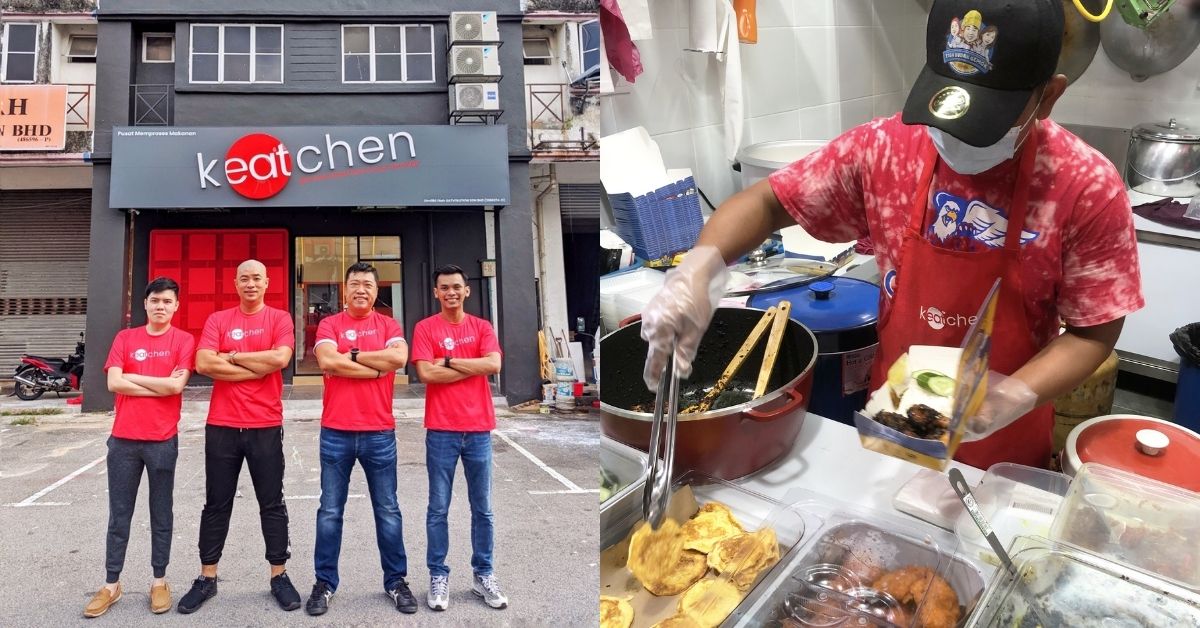Shifting one’s business online in the F&B industry has been necessary for many since the pandemic hit our shores. Those that weren’t able to do so have seen the closure of their outlets and whole businesses that have been built over the years.
Recognising these struggles, kEATchen was launched as a cloud kitchen to help vendors navigate the backend systems of food deliveries. This is especially so for small-time street food vendors who mostly derive their livelihood from walk-in and dine-in customers.
Preserving local street food
It was founded by a group of 4 foodies who were saddened to watch their favourite street food operators shutter stores as they struggled to stay afloat. Moved to do something to help, they launched kEATchen in Ara Damansara as a place for these vendors to prepare their dishes and operate in a delivery-only model.
While there are already a number of cloud kitchen brands around the Klang Valley including Cookhouse, Kitchen Connect, and Grab Kitchen, kEATchen founder Martin Kim isn’t too worried. He believes kEATchen has determined a niche in helping street food vendors stay competitive in a digital space while maintaining their authenticity and brand presence.
Furthermore, from the perspective of F&B businesses, kEATchen is yet another option they can choose from the many in order to stay operational, particularly since each cloud kitchen has its own maximum capacity too.

The vendors that kEATchen is looking to onboard consist of street food operators, including hawkers in kopitiams. Martin pointed that the vendors they’re looking to work with should fall under several criteria, which include having a historical menu connected to Malaysia’s unique staple foods, and being a family operated business that has been handed down to the next generation.
From the criteria, it would appear that kEATchen is, first and foremost, aiming to help vendors that have been in the trade for a generation, and not quite those who are just starting their own street food or hawker business.
Jamming into delivery apps’ traffic
It’s worth noting that kEATchen isn’t the only cloud kitchen looking to target such a market segment of F&B vendors. Air Kopitiam in Cheras brands itself as a “virtual kopitiam,” working exclusively with hawkers to optimise their takeaway system and provide delivery services with an in-house app and fleet.
On the other hand, kEATchen partners with 8 different 3rd-party food delivery companies like GrabFood, foodpanda, EASI, and airasia food, and more, to offer its vendors’ food. This may actually be a better option for both kEATchen and its vendors, as it’s cheaper to outsource instead of hiring and maintaining extra manpower for a business, especially at its current scale.

Despite expressing interest in developing its own ordering platform, the cloud kitchen may be better off without one, as it’s subject to maintenance and development costs. Vendors working with kEATchen would also have better visibility on more popular food delivery apps, and can leverage existing users and co-funded promotions provided by these companies.
Although, that’s not to say that it’s the cheapest solution. Food delivery apps charge their own commission fees, ranging from 10% on airasia food to 25% on GrabFood and foodpanda, based on insights from our previous interviewees operating in cloud kitchens.
While kEATchen did not disclose the rates of its services, its team stated that there are service fees in place for the operational management they support. These services can range from handling backend delivery management to marketing initiatives by kEATchen’s team.
“Any F&B operators that are on delivery platforms will agree to the additional administrative workload it involves. We take away these non-productive tasks from the vendors and let them focus on making good food while we have a team to handle the non-productive tasks,” Martin told Vulcan Post.
Adopting local vendors
Though cloud kitchens are available for entrepreneurs to start a new brand at low cost, kEATchen is mostly a place for existing vendors to scale in a sustainable way. That means, even if a hawker from an existing kopitiam chooses to work within kEATchen, the latter encourages them to remain their original store to also serve dine-in customers once it’s safe again.
“Joining kEATchen will help them in widening their delivery reach geographically to their customer base,” said Martin. “This also levels up their branding awareness in order for them to compete with the bigger food chains that are currently enjoying the benefit of the online food ordering trend which is steadily being adopted by Malaysians since the pandemic started.”
Contrary to what we would’ve assumed, kEATchen’s vendors weren’t a tough crowd to convince when Martin’s team was trying to onboard them.
So since kEATchen’s development in July 2020, they managed to recruit 7 different vendors selling dimsum, chicken rice, nasi goreng, curry mee, ayam kicap, etc. before officially launching in May 2021.

Though Martin was unable to share the average income kEATchen’s vendors get by using its cloud kitchen and services, one can assume that there are benefits to be reaped.
This is because there is no friction holding customers back from ordering; they can order from multiple vendors under kEATchen and still pay only one delivery fee on GrabFood, for example.
But of course, the cost of certain dishes have been marked up slightly to account for commission rates and food packaging, a standard practice for businesses on delivery platforms.
For its future plans, kEATchen will focus on running promotions to onboard more F&B vendors. On a larger scale, the team hopes to collaborate with government agencies in providing affected street food operators with kEATchen’s services to ensure that vendors can digitally evolve their business.
Featured Image Credit: kEATchen









